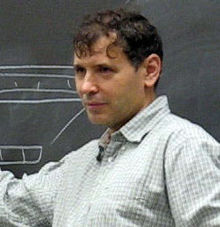Mario Szegedy
Mario Szegedy | |
|---|---|
 | |
| Born | October 23, 1960(age63) |
| Nationality | Hungarian-American |
| Alma mater | University of Chicago |
| Awards | Gödel Prize(2001, 2005) |
| Scientific career | |
| Fields | Computer science |
| Institutions | Rutgers University |
| Thesis | Algebraic Methods in Lower Bounds for Computational Models(1989) |
| Doctoral advisor | László Babai,Janos Simon |
Mario Szegedy(born October 23, 1960) is a Hungarian-Americancomputer scientist,professorofcomputer scienceatRutgers University.He received hisPh.D.in computer science in 1989 from theUniversity of Chicagoafter completing his dissertation titledAlgebraic Methods in Lower Bounds for Computational Models.[1]He held aLady Davis Postdoctoral Fellowshipat theHebrew University of Jerusalem(1989–90), a postdoc at the University of Chicago, 1991–92, and a postdoc atBell Laboratories(1992).
Szegedy's research areas includecomputational complexity theory,quantum computing,computational geometry,andcomputational theory.[2]
He was awarded theGödel Prizetwice, in 2001 and 2005, for his work onprobabilistically checkable proofsand on thespace complexityof approximating the frequency moments in streamed data.[3]His work on streaming algorithms and the resulting data analysis was also recognized by the 2019Paris Kanellakis Theory and Practice Award.[4]With computer scientistsUriel Feige,Shafi Goldwasser,László Lovász,andShmuel Safra,Szegedy won the Test of Time Award at the 2021 IEEE Foundations of Computer Science Conference for their work titledApproximating Clique is Almost NP-Complete.
He is married and has two daughters.
References
[edit]- ^Mario Szegedyat theMathematics Genealogy Project
- ^Szegedy, Mario."Szegedy, Mario".www.cs.rutgers.edu.RetrievedDecember 12,2023.
- ^Gödel Prize website with list of winnersArchivedOctober 7, 2016, atArchive-It
- ^"ACM announces recipients of three prestigious technical awards for 2019".
